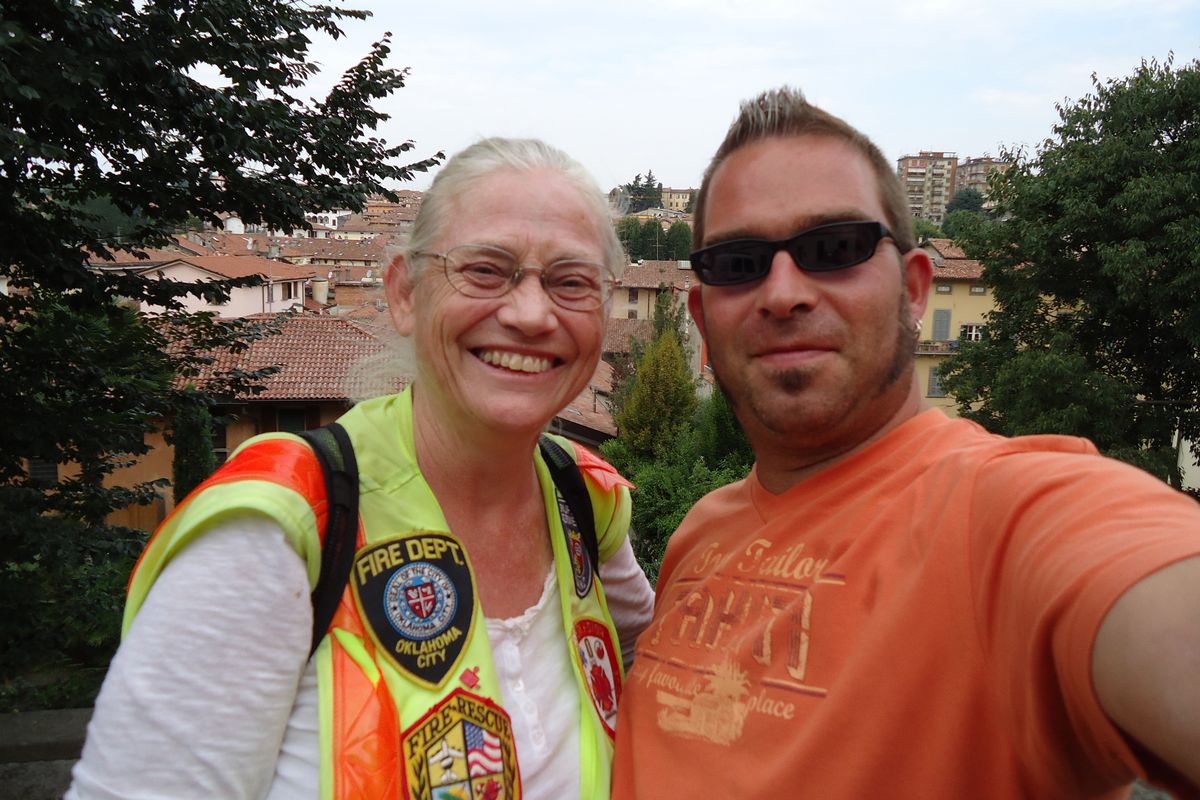Taking steps to save lives after journey in Europe
Deer Park woman plans marrow donor drives in area

Jeana Moore might walk to the ends of the earth if that’s what it took to ensure no one died while waiting for a bone marrow transplant. She’s already walked across four countries.
In January 2011, the Deer Park resident completed a 15-month, 4,434-mile walk across the United States to raise awareness about the National Bone Marrow Registry, which uses a cheek swab to register potential bone marrow donors.
In September, Moore finished a similar trek through Germany, Switzerland and Italy, walking more than 1,000 miles over 137 days, from the Baltic Sea to the Adriatic Sea. While she walked, Moore shared her granddaughter’s story and told people how to sign up for the bone marrow registry in their respective countries.
“In our ordinary, everyday lives, we don’t understand the urgency families are feeling,” said Moore shortly before her walk across America. “But some man in Germany was willing to give for a little girl to live.”
Moore’s granddaughter Jada Bascom nearly died from acute myeloid leukemia in 2007 at Providence Sacred Heart Medical Center. Five rounds of chemotherapy and hundreds of blood transfusions kept the newborn alive while she waited for the only thing that could save her – a bone marrow transplant.
No one in the United States was a match. Then Torsten Huber joined the DKMS registry in Germany and discovered he could save a life.
“Of course I registered to help somebody,” Huber wrote. “I’m really glad that I could help Jada. It is a pleasure for me to get to know the whole family and to stay in touch.”
Huber met Jada and the family when he joined Moore for the last miles of her Steps To-Marrow walk in the United States. He and Moore immediately began planning the Sea-to-Sea walk and he joined her for a portion of it. Moore also took a break in June to attend Huber’s wedding.
“It was such a joy to be invited and a part of this day in our donor’s life,” Moore said. “I felt like I was with an old friend.”
This month, Huber will join the family again when they celebrate the fifth anniversary of Jada’s transplant on Nov. 27. Then, over the next three days they’ll attend donor drives in Missoula, Coeur d’Alene and Spokane.
It’s a process Moore knows well, although this time she won’t need to find a place to sleep after the events. On her long, low-budget journeys, Moore organized and attended many donor drives while carrying her belongings in a backpack and relying on strangers for food and lodging.
“I’m very grateful … the German people, the Swiss people, the Italian people from all walks of life, just like in America, helped me to stay safe and helped me on my way,” said Moore, adding that she wrote thank-you letters to more than 100 people in Europe who assisted. “People were amazing and very kind.”
While Moore accepts donations for the Jada Bascom Foundation, the nonprofit she set up to help recruit donors, she doesn’t fundraise while walking.
“I never ask for money. Our mission is to enroll donors,” she said. “I didn’t want there to be a conflict. They can register very often for free but sometimes there is a small fee. I want them to sign up.”
To this end, Moore wore a reversible pink sign on her backpack drawing attention to her cause in Italian and German. She also carried a small card with a translation of Jada’s story and how someone could register, as well as her most common needs spelled out in both languages.
One of the trip’s highlights was personally thanking several people who’d been instrumental in saving Jada’s life. “I was able to meet some of the people I’d given thanks for,” she said.
In Germany, she met the reporter whose story inspired Huber to join the registry. In Italy, she met employees at Gentium, a biopharmaceutical company that provided the drug Defibrotide to help Jada survive veno-occlusive disease while she waited for her transplant.
“I had the great blessing of being able to thank the researchers and factory workers for developing a drug that saved her life, so she could continue her battle against leukemia,” Moore said.
Now Moore is seeing her own efforts pay off.
To date, more than 11,000 people have registered, with more than 20 bone marrow matches resulting from her efforts. Moore said she’s thankful to see others continue what she started.
“The work in America still continues. There’s a woman in Arkansas doing drives every quarter because we met. … There is work in Phoenix, New York, all around people I’ve met were inspired and said they want to do this,” Moore said. “Now it will continue in Germany, Switzerland and Italy. … The walk inspires others to say, ‘what can I do in my community?’ ”